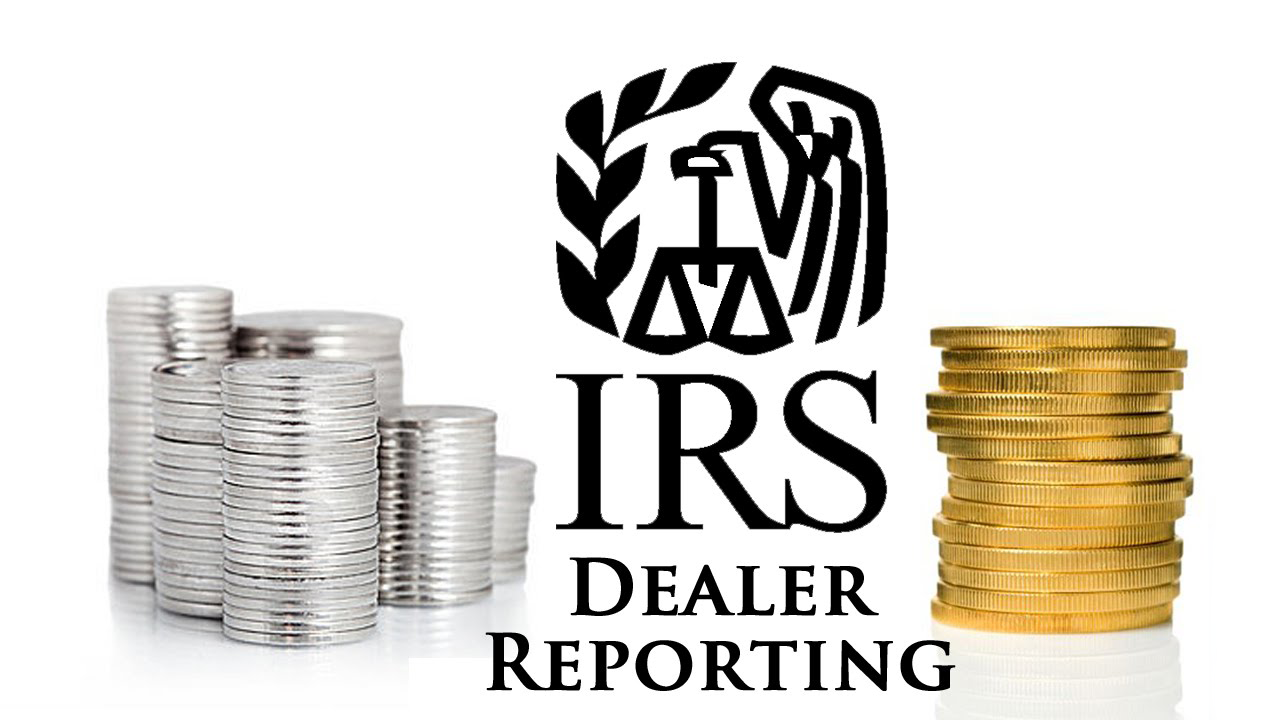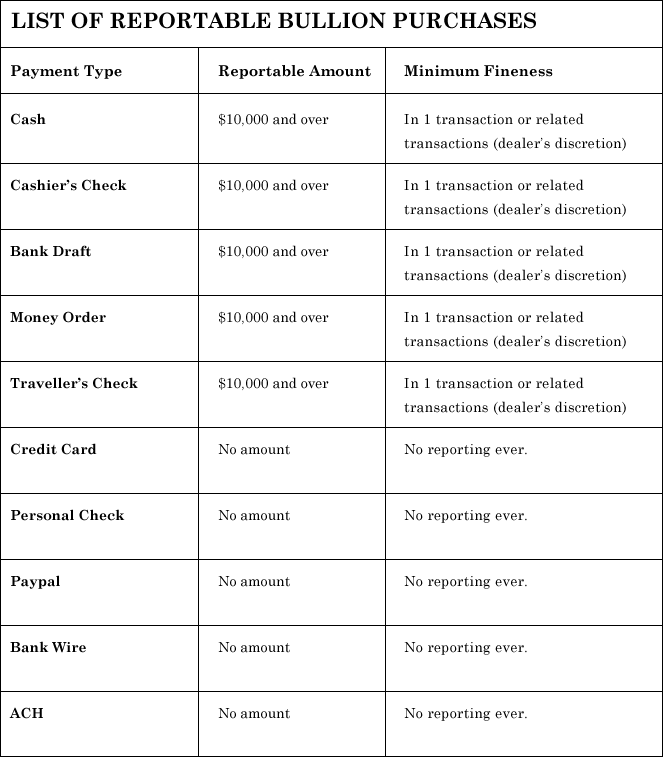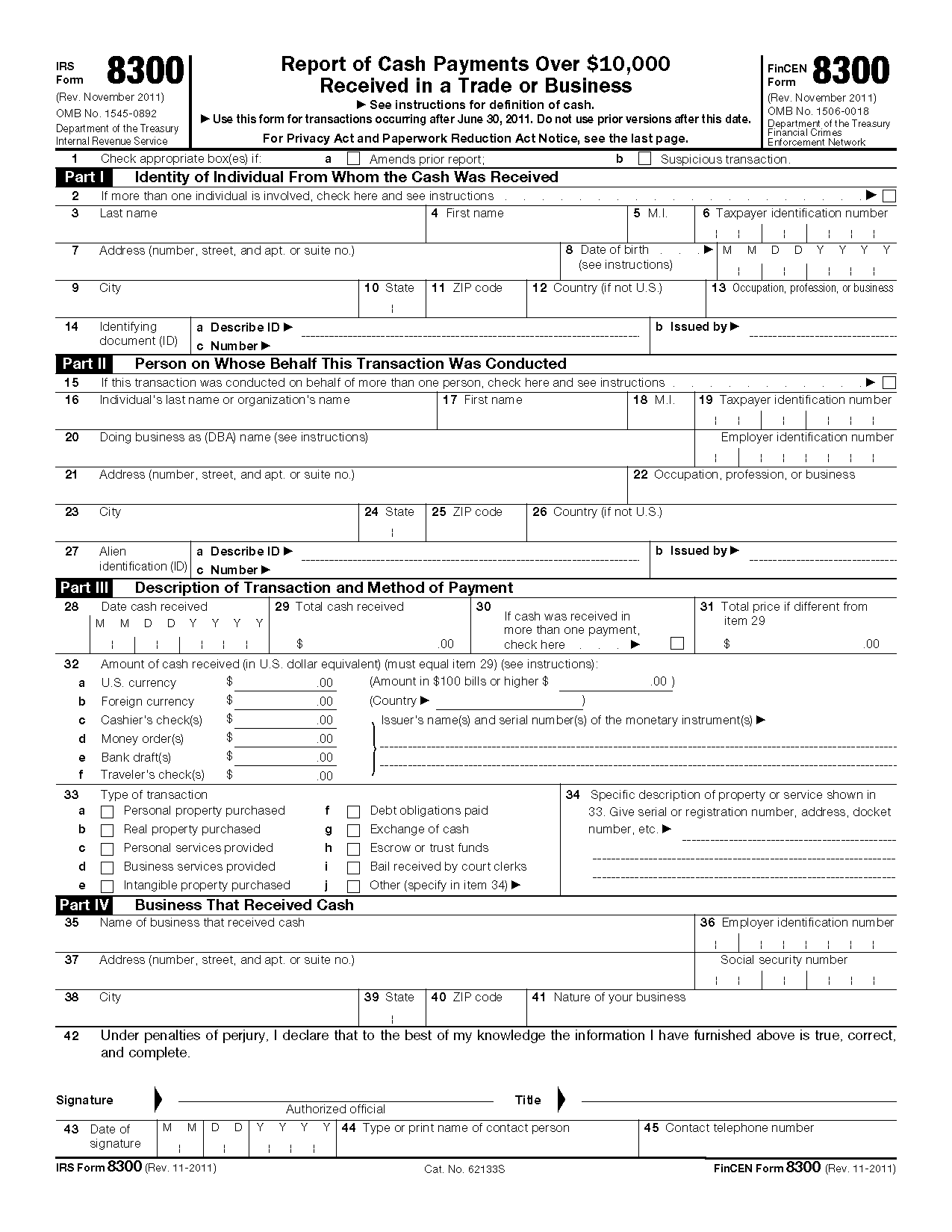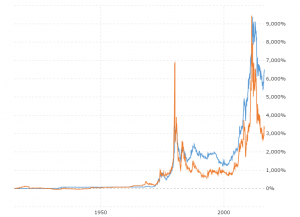How Much Silver Can I Buy Without Reporting
For simplicity’s sake, when it comes to buying and selling bullion, the United States Government wants to know two things: if you are laundering money, or if you are avoiding taxes.
With that being said, the reporting for bullion is more stringent on the selling side than on the buying side. For a detailed guide on SELLING precious metals, see our guide: IRS 1099 Reporting – Are Bullion Sales Private?
On the buying side, the rules are a little more straight forward – any CASH purchases of $10,000 dollars or more may be reportable.
If you buy silver (or any other precious metal) from a dealer and you pay with physical cash or a cashier’s check and the amount is over $10,000 then the dealer must report it to the IRS via an IRS 8300 Form.
The reason this applies only to cash and cashier’s checks is to prevent money laundering. The use of cash is anonymous as are some cashier’s checks and that is why the $10,000 rule is in place for these two methods of payment.
The $10,000 dollar cash limit applies to a single transaction or a series of “related” transactions within a one year period. For example, if you buy $5,000 dollars of silver in cash from a dealer in the morning, and then $5,000 dollars worth of silver in cash in the evening then more than likely you are trying to avoid being reported and the dealer would be required to file an IRS 8300 form. But if the transactions are not related, then they are treated as separate purchases.
So how do the dealer’s know if transactions are related?
If two transactions are within 24 hours of each other then the two are related OR if the dealer knows or has reason to believe that the transactions are a series of connected purchases. So you can see how this is a little gray.
The IRS does state that if you purchase different items, then they do NOT consider that a related transactions. For example if you were to buy $9,000 dollars worth of Silver Eagles one week and then $9,000 dollars worth of silver bars the next week, it should not be reported by the dealer. BUT, if the dealer has reason to suspect you are purposefully trying to skirt the reporting requirements, they may still report you. So, even if you aren’t required to fill out an IRS 8300 form, you could still be asked to based on the sole judgement of a dealer.
What is cash? Cash typically applies to actual currency such as $100 dollar bills and coins. But “cash” is also tied to 4 other forms of payment: cashier’s checks, bank drafts (also a check), traveler’s checks and money orders. All of these methods of payments are anonymous so the government has no way to track who is spending what and that is why the reporting is in place.












Great info. Are sales of American Eagles reported if greater than $10,000. My understanding of the rules is that sales of American Eagles are Not reported in any amount.
Pete, no one reports purchases of anything unless you pay with cash and it’s more than $10k. The reporting requirements come when you sell. The IRS wants to make sure you’re paying your capital gains taxes, which on precious metals is 28% I think. I do think silver eagles are exempt from being reported when sold in any amount, but of course, you’ll still owe the taxes if you have gains.
Looking at the question and response above, let’s say silver jumps and I sell some that I have but I don’t have a receipt from the original sale. How would I figure out capital gains? Would the number of ounces/coins to be sold matter?
The IRS said structuring was to prevent money laundering, but because the IRS tries to keep us under its thumb, they have made it almost impossible for you to make any transaction they do not know about. FUQUE THE IRS. WHAT IT DOESN’T KNOW ABOUT YOUR MONEY DEALINGS WON’T HURT YOU.
This is why I hate the IRS
“Tax his land, tax his wage,
Tax his bed in which he lays.
Tax his tractor, tax his mule,
Teach him taxes is the rule.
Tax his cow, tax his goat,
Tax his pants, tax his coat.
Tax his ties, tax his shirts,
Tax his work, tax his dirt.
Tax his chew, tax his smoke,
Teach him taxes are no joke.
Tax his car, tax his grass,
Tax the roads he must pass.
Tax his food, tax his drink,
Tax him if he tries to think.
Tax his sodas, tax his beers,
If he cries, tax his tears.
Tax his bills, tax his gas,
Tax his notes, tax his cash.
Tax him good and let him know
That after taxes, he has no dough.
If he hollers, tax him more,
Tax him until he’s good and sore.
Tax his coffin, tax his grave,
Tax the sod in which he lays.
Put these words upon his tomb,
“Taxes drove me to my doom!”
And when he’s gone, we won’t relax,
We’ll still be after the inheritance tax.”